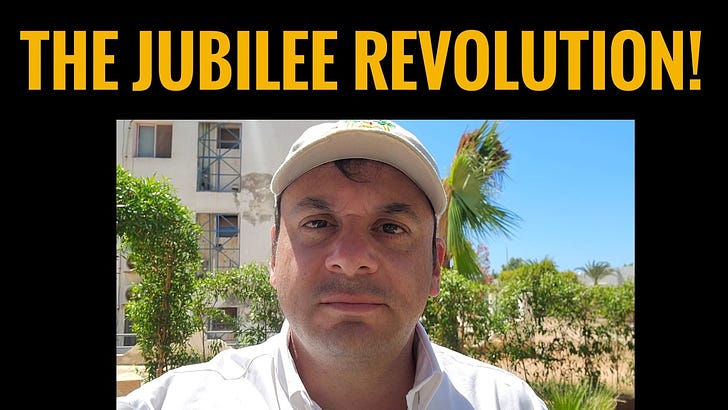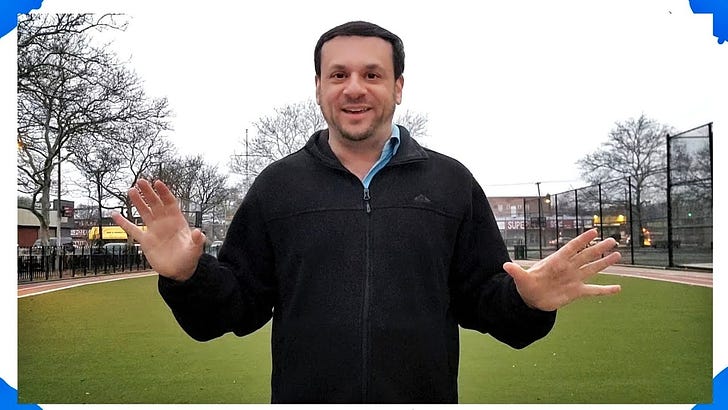The upcoming Jewish month is the last month of the year. It’s name - אלול / Elul - is not Hebraic, it was brought back to Jerusalem from the Babylonian Exile and it remains the way to say September in Turkey.
Jews have long regarded אלול as a mnemonic for אני לדודי ודודי לי (Ani LiDodi ViDodi Li) translated as the title of this post.
God wants humankind to enter the new year, just 40 days from now, free of ill will.
Imagine how light we will all feel on such a day.
I’ve written about the Truth and Reconciliation Existence available to us here (the paywall has been removed for free subscribers and readers).
The Beginning of The Final 50 Year World War Sounds About Right
1. I propose a Truth and Reconciliation E X I S T E N C E .
And I’ve explained a bit about how it would work on a global level and obviate the prison-industrial complex along with all of the paranoic complexes we harbor in this message (available on YouTube and Substack as a podcast if you prefer).
The bare essential timeframe of the plan is laid out in the first 60 seconds of my newest video.
Unfortunately it won't be as easy as asking forgiveness from those we’ve wronged (or who we think may regard us as having wronged them).
It is, unfortunately, harder than that.
Last week I spoke about Kamtza and Bar Kamtza as a rabbinical explanation for why the previous Jewish Commonwealth was destroyed by Rome in the year 70.
The short of it was that God does not work in miraculous ways but in common sense ways.
A wealthy patron of the rabbis threw a lavish party for all of the important people in the land. Among the many invitations sent, he sent one to a fellow named Kamtza, mail mixups happen and the invitation was delivered to Bar Kamtza a fellow who had been on the outs with this wealthy patron.
Pleased to see this sign of reconciliation he arrived to the gala. Displeased to see his arrival, the host ordered him removed from the event.
This was after he had already made the social rounds so there was no way that he could make an unnoticed exit. In terror of the intense humiliation of suddenly becoming persona non grata among anyone who mattered, he begged forgiveness, offered to pay for his own meal and ecen offered to pay thrice the entire cost of the event.
Unmoved and unmitigated, the host refused to accept his offer and had his guards throw the man out while all of the community leaders just stood and watched, none daring to be the first single person to step forward to spare Bar Kamtza this awesome shame.
In a state of eternal cringing and loathing Bar Kamtza took revenge on all his people by fooling the Roman rulers into believing that the Jews had mocked him at their temple and refused his gracious sacrificial offering.
The End. Two thousands years of pogroms, exiles and holocausts to follow.
What many Rabbis have wondered over the years has been why the story is known as that of ”Kamtza and Bar Kamtza”.
The host remains anonymous while the absent Kamtza is besmirched by the title of the tale. After all, he never did anything!
The best response I have heard is that when Kamtza failed to receive his invitation he should have inquired about it. Had he done so, the issue would have been resolved before the party began and Bar Kamtza would never have innocently arrived to a party he was not supposed to be invited to.
The lesson here is that unfriendliness from a presumed friend shouldn’t be taken as a ghosting slight, but inquired about.
The rules relating to the Biblical dictum to “Love Thy Neighbor” are delineated by the great Moses Maimonides (aka רמבם Rambam, aka ابو عمران موسى ابن ميمون ابن عبد الله Abu Imran Musa bin Maymun ibn Abdullah) in chapter 6 of דעות / Deos, read and translated here.
The sparse relevant paragraph of which is:
Prepare yourself because reconciliation will be A LOT harder than asking for forgiveness. It will be offering to give it.
Not freely and not without heartfelt understanding and reconciliation by the offending party and your own self.
Jesus may not have been God but if he truly held no grudges than he was closer to God than us.
Mortal men may strive to be able to bless those who curse them, but an insincere blessing is obviously a worthless one.
The Torah does not demand we forfeit our human instincts. It requires that we recognize them and seek redress and reconciliation in the right way.
We shall have to draw up an honest list of all those whom we feel have wronged US even by the absence of an invitation - and, with the genuine hope of eventual friendship, risk embarrassing ourselves by bringing up the fact that our feelings have been hurt.
I can't think of anyone I have anything against, but while that sounds super holy and super strong I assume it isn't.
We have all hurt each other, and making ourselves vulnerable enough to first feel the hurt and then to approach each other and genuinely ask: “?למה עשית לי כך וכך” letting the other person know that you feel they’ve wronged you will be hard (at least for those of us with an adult distaste for “blame culture”).
I was told all of this last night in ways too mysterious to explain. Suffice it to say it wasn't what I wanted to hear, but it's what I heard.
Moshe





